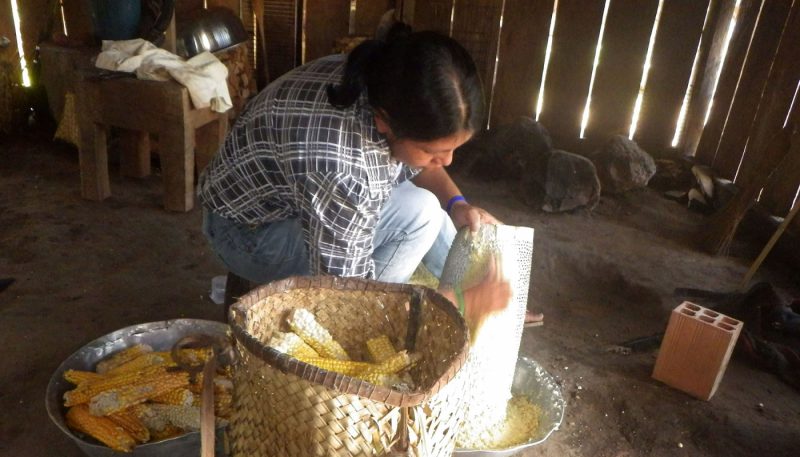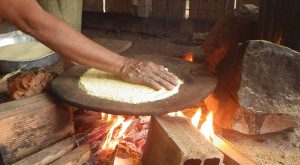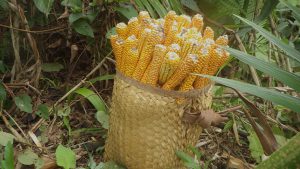The last day of the year. Out with the old year, in with the new. But no time off for the holidays here in the village; all the festivities actually mean lots of extra opportunities for new-to-me cultural events which make for excellent, fascinating culture and language acquisition classes! Today I am observing the process of making a delicious traditional corn dish, called mambe .
Please join me on a wooden bench in my friend’s kitchen as her sister, her mom and her aunt work together in this culinary endeavor. Instead of sharing language and culture notes on “How To Make Mambe ,” however, I’d like to share a heart lesson that God taught me through this class. You’ll need to use a bit of imagination because we are going to look at this process from the corn’s point of view.
The Agony of the Corn
The ear of corn is first grated, rubbed hard and firm time and time again against a sharp, rough metal grater with jagged holes that look as if they were punctured by nails. Its kernels are thus scraped off slowly and painfully. Then the cob, bereft of its goodness, joins a heap of corn cobs already on the ground.
Meanwhile, the grated kernels of corn, having already been subjected to complete torture, are given a rest, right? Not even close! They are unceremoniously dumped into a huge pestle and pounded mercilessly with a heavy mortar, beaten up and down, crushed from side to side, round and round. The crushed corn is then sifted. The fine yellow powder which falls through the mesh is reserved, while the coarse bits that remain on top are tossed back into the pestle and pounded again. Each repetition of the process pulverizes the grains of corn a bit more, until all that remains is a fine yellow powder. This is mixed with a bit of water and mashed manioc root.
Next comes the fire. Mambe is baked on a round, flat stone, positioned just a couple of inches over a scorchingly hot fire. All moisture is baked right out of the cornmeal, resulting in a finished tortilla-like product that is hard, dry and crunchy.
This is only one of several “recipes” I have observed during corn season, all treating the corn in different ways to make different traditional foods. The other recipes are no gentler to the corn. At any point of making mambe or manzuat or ee or some other food, I can imagine the corn saying, “Stop! That’s enough! It hurts too much! I can’t take it anymore! How much suffering do you think I can deal with? Why is this happening to me? When will the pain end? What is the point?”
‘You Are the Corn’
Sound like anything you’ve ever said or thought? So have I.
As I sat in the hot, hot kitchen the last day of the year, notebook, pencil and camera in hand, the Holy Spirit spoke to my heart with His still, small voice: “You are the corn.” That simple analogy provided much food for thought, prayer and meditation in other quieter moments alone with God.
Basically, the illustration is this. Each one of us who are children of God are ears of corn. God is the One who has a plan and purpose, a recipe, if you will, for each of our lives. Here are some of the truths God showed me or reminded me of based on this illustration:
- God has different purposes and plans for different children, for different servants.
- The process, circumstances and life experience He gives to each one will look and feel different.
- The final product will also be different, as well as the ultimate use to which He puts each of our lives. Some will be the crunchy corn tortillas; others will be the staple food-drink of the culture; yet others will be a creamy, hot chowder.
- It’s not about “who I am,” “who I want/choose to be,” or “who I can become”– all seem to be catchphrases in our culture. It’s about allowing God to make each one of us who He wants us to become and cooperating with Him in the process instead of fighting or protesting His work in our individual lives.
- The purpose of becoming who God makes us is not for our own benefit or self-realization. It is to be used and consumed (figuratively speaking) by others, for their spiritual life, health and sustenance. Paradoxically, we find that giving ourselves for others brings the greatest blessing and fulfillment of all.
- We glorify God in being consumed by others, bringing spiritual life and nourishment where there would have been death or famine. (And what a privilege and honor that God would use us in a given time and place for the life of people around us! Jesus is all they really need, after all; yet God allows us to participate in bringing Jesus’ life to others, and in that way, we are part of His life-giving work).
- No type of “corn food” is categorically better or worse than another. They are all nourishing and delicious, but different. Similarly, no servant nor his or her form of service is better or worse, superior or inferior. As all real foods nourish and sustain, so all who truly serve God are used to feed His lambs and build His church in one way or another.
- The preparation process of making us useful for God’s purposes will sometimes appear ruthless, senseless, pointless, wasteful and unspeakably painful. To us it will seem like tribulation, trial, suffering, anguish and affliction. The ordeal and distress may drag on endlessly — from our perspective.
- The preparation of the corn seems to take forever. Yet the one preparing it has a goal in sight and knows that it will be ready after a certain number of steps, duly carried out. The corn has no way of knowing this. The prep work in our lives may seem to take forever. Yet, God, the One preparing us for His ultimate purpose, has an end goal in sight and knows that we will be ready after a certain number of steps, carefully planned and executed by Him. We have no way of knowing how many steps His work requires or when we are truly ready.
Be Ready for God’s Hand
Friend, if you are a servant of God, do not be surprised if “life beats you up” sometimes, like corn beaten in a mortar with a heavy wooden pestle. But ask yourself, “Is it really life, or is it God?” A common attitude expressed in the church and on the mission field is “God allowed this trial in my life.” Sometimes that is true. That thought is often my first reaction to suffering. But God has challenged me to think about suffering in a radically different way. I suspect that assuming that most of our pain and suffering is “allowed by God” is a wishy-washy, instant-fix generation, couch potato Christian perspective. There are times (many more than we would like to think, I believe) that God is actually the Unseen Hand causing or orchestrating what feels like suffering.
Upon writing this, I admit to sensing a slight shiver. I don’t like suffering. That double whammy staph infection last year was painful. It hurts to be far away from my nieces and nephews and to miss important stages of their development. Stomachaches, migraines and back pain are frustrating, especially as they slow my progress in language learning.
So I am a little bit afraid of what the next step of God’s preparation process in my life might be. Interesting that God brought this illustration to my attention the very last day of the old year, looking ahead to the next. What could He be preparing me for?
God’s Recipe Turns Out Great
I shouldn’t be afraid. God knows what He’s doing. He has a “recipe” all planned out, and the end result will be oh-so-unimaginably good. In the moment I perceive His finished work, all the delays and suffering will make sense and suddenly seem minimal compared to the glory of what God has in store. My heart’s desire is that whatever He is doing in me will prove to be for the spiritual life, growth and nourishment of the Neno people to whom God has sent me. And honestly, deep down, although my flesh shrinks back from the thought, if it takes more intense suffering to accomplish this purpose or any other unknown purpose God might have, I’m OK with that.
Will you please pray for me? Pray that God will do whatever it takes to make me who I need to be to be usable for the Neno people and for all His purposes. Pray that I will accept with joy whatever suffering or trials this entails. Pray that I will rightly discern such things, not as attacks from the enemy or as “what God allowed” but as His very plan. Pray that God will turn my fears into courage and my self-preservation instincts into selfless surrender to His hand.
Pray also for yourself. Only you and God know how these truths apply to your life and heart and situation.
“Verily, verily, I say unto you, Except a corn of wheat fall into the ground and die, it abideth alone: but if it die, it bringeth forth much fruit. ” John 12:24









